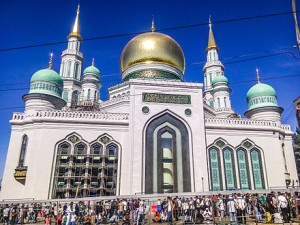Amid Concerns Over Islamic Extremism, Europe’s Largest Mosque Opens in Moscow
Amidst a rising wave of anti-Muslim sentiment, local government opposition, and financial challenges, Moscow inaugurated a new $170 million mosque on September 23.

After ten years of construction, the Moscow Cathedral Mosque, capable of housing up to 10,000 worshippers, opened its doors to thousands of Muslims on the eve of Eid al-Adha–known as Kurban Bairam in Russia–a holiday commemorating the end of the hajj, the annual Muslim pilgrimage to Mecca.
Russian President Vladimir Putin, joined by President Recep Tayyip Erdogan of Turkey and President Mahmoud Abbas of the Palestinian Authority, addressed the rise of Islamic extremism in a speech given at the mosque’s opening ceremony.
Emphasizing the fundamental differences between the peaceful practices of Muslim worshippers in Russia and the extremist interpretation of the Qur’an advanced by the self-styled Islamic State (IS), Putin praised local Muslim leaders for their efforts in resisting propaganda.
“Their [IS] ideology is built on lies, on open perversion of Islam. They are trying to recruit followers in our country as well,” Putin said.
Some religious leaders believe that creating an environment for safe worship might prevent the increasing number of youth from flocking to IS and other extremist organizations. Despite the size and scope of the new mosque, it still does not provide adequate accommodations for the two million Muslims currently residing in Moscow.
With only six mosques in the entire city, people often congregate on the streets surrounding the mosques during major holidays. The council of muftis in Russia has suggested that every Moscow neighborhood have a mosque in order to handle the volume of worshippers.
Wary of frequent terrorist bombings since the early 2000s, many Moscow residents are exhibiting reservations about the opening of the mosque. The line between peaceful worship and the radical activities which Putin alluded to in his speech often becomes blurred amidst the chaos of terrorist attacks.
Although President Erdogan praised Russia’s efforts to promote diversity as a “vivid example of how to be good neighbors” at the inauguration ceremony, the public remains largely divided on the topic of religious tolerance, and hostility toward the Muslim population continues to be a prominent issue in Russia. The idea of “Russia for Russians” finds popular support among Muscovites, in spite of the country’s rich multiethnic history.
The widespread Islamophobia in Moscow is also fueled by its nationalist mayor, Sergei Sobyanin, who sought to ban the construction of new mosques in the capital. Claiming that the majority of worshipping Muslims are not Russian citizens but rather “labor immigrants,” Sobyanin promised to put an end to future mosque construction projects once the Moscow Cathedral Mosque was completed.
Yet the lengthy project saw no shortage of supporters. The Moscow Cathedral Mosque was financed entirely through the private sector, relying on a wealthy Russian businessman as well as generous donations by the Turkish government and the Palestinian Authority to complete construction. In light of the open hostility of Moscow’s mayor and the anti-Islamic sentiments prevalent among its citizens, the federal government sidestepped controversy over the financing of the project.
It remains to be seen whether Abbas’s hope for the new mosque as “a center spreading the spirit of peaceful coexistence of religions and peoples” will come to fruition.
